Harvest of Hope
By Cheryl Tevis1
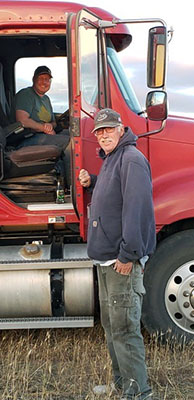
Mike with son Tyson in truck cab
Mike Koepke was 13 when he began helping his dad on the family farm near Cut Bank, Montana. “My older brother told me he wasn’t coming back after college, so I decided to make agriculture my life,” he says.
In 1982 he and his wife, Sheila, graduated from college, and started farming. Over the next 31 years, the Koepkes grew their business, raised a family of three, and looked forward to farming for as long as they enjoyed it.
One foggy October morning in 2013, this goal became more challenging. Mike had harvested the spring wheat and signed a contract to sell it. “I took Sheila to work, and headed home to start hauling,” he says.
Mike was driving their 2012 Ford Fusion when suddenly he saw headlights coming at him in his lane. A big belly dump semi-truck hauling gravel had pulled out to pass a 4-wheel-drive tractor. He braced for impact, as the semi hit him head-on.
“Pieces of the car were disintegrating, metal and plastic were twisting and breaking apart around me,” he says. “I cried out, ‘Oh, God. . . Oh, God! I asked for His help.”
Trapped in the vehicle, Mike dialed 911 three times, but the line was busy. The sheriff’s line was busy, too, but he reached Sheila. By the time a co-worker rushed her to the scene, the sheriff, fire trucks, and ambulance had arrived.
“Thank goodness, he was driving a vehicle with safety features, and wearing his seat belt,” Sheila says.
The fire department used the Jaws of Life to extricate Mike, and he was taken to Northern Rockies Medical Center in Cut Bank. X-rays didn’t indicate life-threatening injuries. “I was told, ‘If you can stand for five minutes, you can go home’,” he says.
But as Mike tried to swing his legs off the exam table, he felt his pelvis abruptly shift. A CT scan revealed it was shattered. He was taken by ambulance to Great Falls, where he had surgery to insert a plate and eight screws. The torn ligament in his left leg, and an injured right wrist would need to heal.
Mike was hospitalized for nine days. At home, he began the slow process of recovery. “I couldn’t make it up two steps into the house with a walker—I had to hop,” he says. Sheila adds, “Every day, he got up, put his clothes, shoes and socks on, and hopped to a living room chair. He never stayed in bed. Ever.”
Three months after the accident, the Koepkes’ son Drew was married. “We hid Mike’s crutches in the wedding pictures,” Sheila says.
“I had to learn to walk again,” Mike says. But physical therapy three days a week required a team effort. Sheila was working full-time, so their children: Tyson, a molecular plant scientist at Washington State University, Ashley, an associate registrar at the University of Providence in Great Falls, and Drew, an information technology specialist who lives in Missoula, adjusted their schedules so they could take him. And that’s not all.
“My kids taught me to drive again,” Mike says. Sheila adds, “They didn’t tell me—I was at work.”
He returned for surgery on his wrist in June, and a steel plate and nine screws were inserted.
Taking care of business
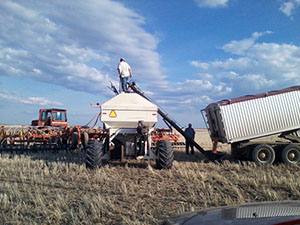 In the meantime, the farm work couldn’t wait. The Koepkes farm about 2,000 owned and crop-shared acres 20 miles south of the Canadian border. The immediate need was to hire trucking to deliver their high protein spring wheat for export to Pacific Rim countries.
In the meantime, the farm work couldn’t wait. The Koepkes farm about 2,000 owned and crop-shared acres 20 miles south of the Canadian border. The immediate need was to hire trucking to deliver their high protein spring wheat for export to Pacific Rim countries.
Their malt barley goes to MALTEUROP in Great Falls. “We feed the world, and try to quench its thirst,” Mike says.
Adjustments also were required on the home front: the Koepkes’ century-old farmhouse. “There was one small bathroom, with a toilet, sink, and tub,” Sheila says. “Mike used a transfer bench and a hand-held shower head—but it didn’t work for what he needed.” In January 2014, their remodel featured an accessible toilet, walk-in shower, safety bars, and built-in bench. “It made a safe place for him to shower independently while I was at work,” she says. “Small changes can be big.’”
Mike progressed from crutches to a cane. “I still was having balance issues,” he says. He also noticed difficulties with dexterity and calculations.
It was 2016 before they recognized the cause. “We lived in a place of shock and trauma for a long time,” Sheila says. “We just got used to the way things were.”
After tests revealed that Mike had suffered traumatic brain injury (TBI), he went to speech and memory therapy. “Mike never felt sorry for himself,” Sheila says. “We just kept trying to move forward.”
In the spring of 2014, the Koepkes hired a neighbor to plant. “My goal was to harvest it myself,” Mike says. “The kids came home weekends or took time off to help us do it.”
In February 2015, Mike’s torn ligament led to a total knee replacement. Again, he hired the planting and spraying.
In 2016, Sheila’s brother discovered the National AgrAbility Project (www.agrability.org). Bill Field, National AgrAbility director, Purdue University and Bill Begley from Life Essentials, a mobility equipment company, visited the Koepkes to share information about assistive farm equipment and adaptations.
“That was our best day in three years,” Sheila says. “We were struggling to get back to normal–we just didn’t know how.”
Thanks to AgrAbility, Mike began listening to music as therapy, and practicing repetitive phrase and word exercises. AgrAbility also offered tips for reorganizing his farm shop.
In 2019, the Koepkes traveled to Maine for their first National AgrAbility Training Workshop, where they found an encouraging sense of kinship, and useful workshops.
In 2020, Sheila retired after 20 years as a Farm Service Agency program technician. “I needed a
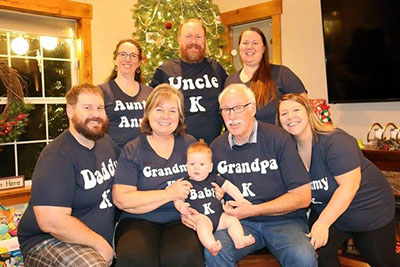
Front: son Drew, Sheila, grandson Kael, Mike, daughter-in-law Selene. Back: daughter-in-law Anne Marie, son Tyson, daughter Ashley.
job, so I was up at 6 a.m. the day after,” she says.
Mike handled the spraying, with help from Drew, Tyson, and Sheila.
The Koepkes recently welcomed the birth of their first grandson. “Mike has come a long way,” Sheila says. “We’re still looking at adaptive equipment, as our budget allows. We didn’t realize there’s so much hope out there.”
She adds, “I don’t think I can convey how much better AgrAbility has made our lives. Bad things can happen to good people. We all go through challenges in life.”
1Cheryl Tevis was senior risk management editor with Successful Farming magazine for many years. She is currently a freelance writer and editor with AgPerspectives, Inc. and president of Iowa Women in Agriculture.
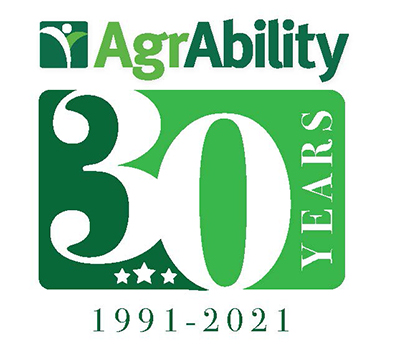 2021 is also a remarkable year for AgrAbility because it marks the program’s 30-year anniversary. First authorized in the 1990 Farm Bill, AgrAbility began functioning in 1991 with eight state and regional “demonstration projects” and the NAP. With a slight increase in funding this year, the program is scheduled to have 21 state projects starting in September, in addition to the NAP.
2021 is also a remarkable year for AgrAbility because it marks the program’s 30-year anniversary. First authorized in the 1990 Farm Bill, AgrAbility began functioning in 1991 with eight state and regional “demonstration projects” and the NAP. With a slight increase in funding this year, the program is scheduled to have 21 state projects starting in September, in addition to the NAP.
 In the meantime, the farm work couldn’t wait. The Koepkes farm about 2,000 owned and crop-shared acres 20 miles south of the Canadian border. The immediate need was to hire trucking to deliver their high protein spring wheat for export to Pacific Rim countries.
In the meantime, the farm work couldn’t wait. The Koepkes farm about 2,000 owned and crop-shared acres 20 miles south of the Canadian border. The immediate need was to hire trucking to deliver their high protein spring wheat for export to Pacific Rim countries.
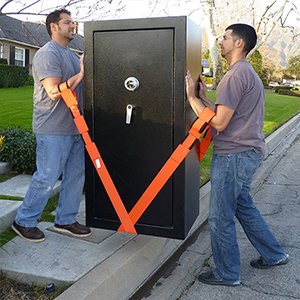 Forearm Lifting Straps are long, padded straps designed to allow two people to lift and carry a heavy, bulky object more easily. The strap, which is run from under the object up to and fastening around each forearm, creates a 45º angle that maximizes lifting/carrying strength by redirecting the object’s weight from the arms to the legs. Straps can be adjusted to accommodate the object’s and persons’ height. (Visit
Forearm Lifting Straps are long, padded straps designed to allow two people to lift and carry a heavy, bulky object more easily. The strap, which is run from under the object up to and fastening around each forearm, creates a 45º angle that maximizes lifting/carrying strength by redirecting the object’s weight from the arms to the legs. Straps can be adjusted to accommodate the object’s and persons’ height. (Visit 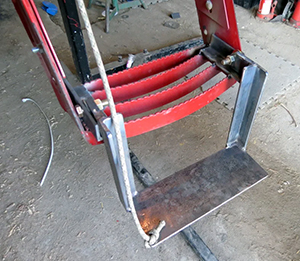 Fold-Up Added Step (Online Plans). An extra step below the bottom one on a tractor or combine can help reduce strain on the knees when climbing on/off the machine. These plans include a list of the likely on-hand items needed to build the step plus text and photos on how it’s made and mounted. So as not to pose a clearance problem while driving, the step is flipped up and down via a rope. (Visit
Fold-Up Added Step (Online Plans). An extra step below the bottom one on a tractor or combine can help reduce strain on the knees when climbing on/off the machine. These plans include a list of the likely on-hand items needed to build the step plus text and photos on how it’s made and mounted. So as not to pose a clearance problem while driving, the step is flipped up and down via a rope. (Visit 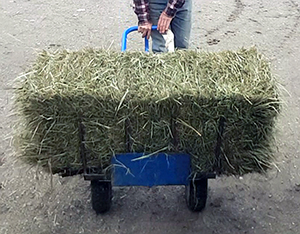 Hay-Bale Dolly (Online Plans). Carrying hay bales can be a struggle for those with back, leg, and arm impairments. With this dolly, one can both lift up and transport a single bale with reduced effort. The plans include a list of the supplies needed, text and photos on how to assemble it, and video showing how it works. (Visit
Hay-Bale Dolly (Online Plans). Carrying hay bales can be a struggle for those with back, leg, and arm impairments. With this dolly, one can both lift up and transport a single bale with reduced effort. The plans include a list of the supplies needed, text and photos on how to assemble it, and video showing how it works. (Visit 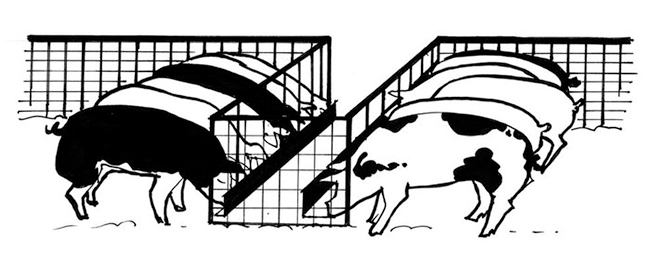 Walk-In Livestock Feeder. This type of feeder extends from the pen fence into the pen, with hog panels blocking off the back end; and it’s wide enough so that one can enter carrying feed buckets. The fences on both sides are gapped in such a way that the hogs can get to the feed but not into the feeder. This design would work for other types of penned livestock.
Walk-In Livestock Feeder. This type of feeder extends from the pen fence into the pen, with hog panels blocking off the back end; and it’s wide enough so that one can enter carrying feed buckets. The fences on both sides are gapped in such a way that the hogs can get to the feed but not into the feeder. This design would work for other types of penned livestock.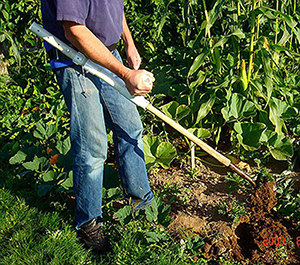 Homemade Single-Arm Gardening Equipment (SAGE) includes standard hoes, shovels, rakes, pole pruners, etc. that are modified to accommodate the needs of persons with one arm or limited mobility on one side of the body. Utilizing a support belt with a pivot bolt plus a handle extender (made of items available from any hardware store), these adapted tools improve posture while reducing stress of the wrist and back. (Visit
Homemade Single-Arm Gardening Equipment (SAGE) includes standard hoes, shovels, rakes, pole pruners, etc. that are modified to accommodate the needs of persons with one arm or limited mobility on one side of the body. Utilizing a support belt with a pivot bolt plus a handle extender (made of items available from any hardware store), these adapted tools improve posture while reducing stress of the wrist and back. (Visit  Raised Garden Beds. Although the commercially produced bed pictured here is corrugated steel, garden beds can be constructed of many types of material (often already on-hand), such as wood, bricks, pieces of sheet metal, (even old refrigerators or chest-type freezers), and can be of any dimension and height. (Visit
Raised Garden Beds. Although the commercially produced bed pictured here is corrugated steel, garden beds can be constructed of many types of material (often already on-hand), such as wood, bricks, pieces of sheet metal, (even old refrigerators or chest-type freezers), and can be of any dimension and height. (Visit 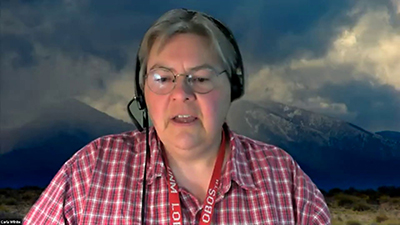
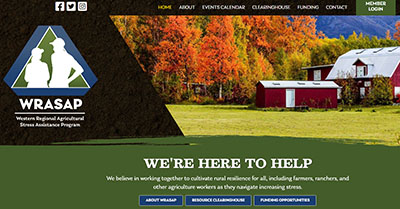 In the last edition of AgrAbility Harvest, we mentioned that USDA had invested $10 million in 2019 to fund four regional Farm and Ranch Stress Assistance Network (FRSAN) centers that cover all U.S. states and territories. During 2020, USDA greatly enhanced the network’s potential to provide stress-related assistance to agricultural workers by committing $28.7 million to four regional FRSAN centers for three-year grants:
In the last edition of AgrAbility Harvest, we mentioned that USDA had invested $10 million in 2019 to fund four regional Farm and Ranch Stress Assistance Network (FRSAN) centers that cover all U.S. states and territories. During 2020, USDA greatly enhanced the network’s potential to provide stress-related assistance to agricultural workers by committing $28.7 million to four regional FRSAN centers for three-year grants: Arthritis is consistently one of the top three disabling conditions reported by AgrAbility clients. The disease can affect many joints in the body with a wide range of symptoms, and thus, its impact on farm-related tasks can be profound. On a larger scale, arthritis affects one of every three adults in rural areas, and approximately half of rural residents with arthritis report experiencing arthritis-attributable activity limitations.
Arthritis is consistently one of the top three disabling conditions reported by AgrAbility clients. The disease can affect many joints in the body with a wide range of symptoms, and thus, its impact on farm-related tasks can be profound. On a larger scale, arthritis affects one of every three adults in rural areas, and approximately half of rural residents with arthritis report experiencing arthritis-attributable activity limitations.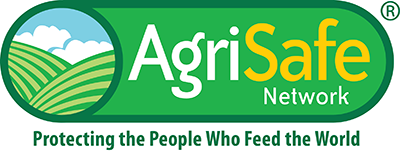 Anyone involved with agricultural safety has likely encountered resources or events from AgriSafe Network. Founded in 2003 by rural nurses, the organization focuses on training professionals to care for agricultural producers and on assisting the producers themselves.
Anyone involved with agricultural safety has likely encountered resources or events from AgriSafe Network. Founded in 2003 by rural nurses, the organization focuses on training professionals to care for agricultural producers and on assisting the producers themselves.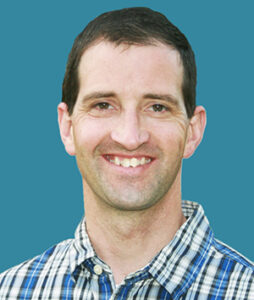 Ned Stoller will serve as the assistive technology (AT) specialist. In that role, he will help with developing The Toolbox, act as liaison to the Rehabilitation and Assistive Technology Society of North America (RESNA), and address AT questions from the state AgrAbility projects. Ned is already functioning as NAP’s consultant to develop and document low-tech AT for farmers worldwide and to help develop a low-tech section of The Toolbox.
Ned Stoller will serve as the assistive technology (AT) specialist. In that role, he will help with developing The Toolbox, act as liaison to the Rehabilitation and Assistive Technology Society of North America (RESNA), and address AT questions from the state AgrAbility projects. Ned is already functioning as NAP’s consultant to develop and document low-tech AT for farmers worldwide and to help develop a low-tech section of The Toolbox. Kimber Nicoletti-Martínez will serve as Latino outreach coordinator. She has extensive experience in working with Latino migrant/seasonal farmworkers and was named 2018 National Social Worker of the Year by the National Association of Social Workers. Her participation on the NAP should greatly enhance the project’s outreach to Latino agricultural workers and organizations that serve them.
Kimber Nicoletti-Martínez will serve as Latino outreach coordinator. She has extensive experience in working with Latino migrant/seasonal farmworkers and was named 2018 National Social Worker of the Year by the National Association of Social Workers. Her participation on the NAP should greatly enhance the project’s outreach to Latino agricultural workers and organizations that serve them.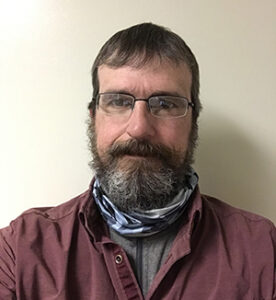 Ed Sheldon has been working with NAP for more than a year in a variety of capacities and will function as its outreach coordinator during the next grant cycle. He will help coordinate outreach activities, assist with resource development, promote AgrAbility services to Cooperative Extension staffs, and support NAP’s programming efforts for underserved populations and veterans. He also handles all calls to NAP’s toll-free helpline.
Ed Sheldon has been working with NAP for more than a year in a variety of capacities and will function as its outreach coordinator during the next grant cycle. He will help coordinate outreach activities, assist with resource development, promote AgrAbility services to Cooperative Extension staffs, and support NAP’s programming efforts for underserved populations and veterans. He also handles all calls to NAP’s toll-free helpline.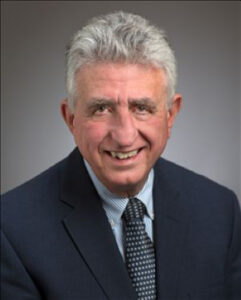 Dr. Bob Aherin began his agricultural safety and health career at the University of Illinois in 1984 and became the project director of Illinois AgrAbility Unlimited when the program started in 1991. Throughout his decades of service, Bob distinguished himself as a leader not only within AgrAbility but also within the worldwide agricultural safety movement.
Dr. Bob Aherin began his agricultural safety and health career at the University of Illinois in 1984 and became the project director of Illinois AgrAbility Unlimited when the program started in 1991. Throughout his decades of service, Bob distinguished himself as a leader not only within AgrAbility but also within the worldwide agricultural safety movement. Steve Swain became Indiana AgrAbility’s rural rehabilitation specialist in 2000 and NAP’s assistive technology specialist in 2008. During his tenure, he worked in-person with hundreds of farmers, assisted thousands more through the program’s toll-free helpline, and earned Assistive Technology Professional certification from RESNA. He spent long hours, often around kitchen tables, not only gathering information for reports but also serving as a compassionate ear to the struggles of farmers who are often overwhelmed by newly acquired disabilities.
Steve Swain became Indiana AgrAbility’s rural rehabilitation specialist in 2000 and NAP’s assistive technology specialist in 2008. During his tenure, he worked in-person with hundreds of farmers, assisted thousands more through the program’s toll-free helpline, and earned Assistive Technology Professional certification from RESNA. He spent long hours, often around kitchen tables, not only gathering information for reports but also serving as a compassionate ear to the struggles of farmers who are often overwhelmed by newly acquired disabilities.